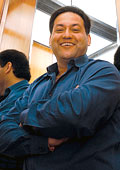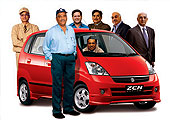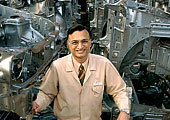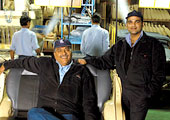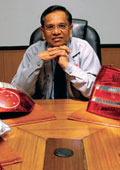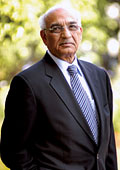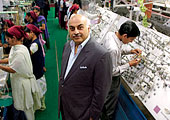|
|
GROUP: Asahi
India Glass
PROMOTER: B.M. LABROO & SANJAY LABROO (above)
REVENUES: Rs 591 crore (2005-06)
MARUTI'S STAKE: 11.11 per cent in Asahi India Glass
|
ASAHI INDIA GLASS
The Giant from Nowhere
Back in 1983, the newly set
up public sector car maker Maruti Udyog had a peculiar problem.
When it approached Allahabad-based Hindustan Safety Glass (HSG)
for supply of automotive glass, it just got rebuffed. The vendor,
which used to supply to dominant car makers such as Hindustan
Motors and Premier Automobiles and was the largest manufacturer,
didn't want to upset its big customers by signing on an upstart.
Besides, HSG wasn't prepared to believe that Maruti could actually
manufacture 100,000 cars by 1990 as it was promising.
|
|
| Small but bountiful:
Krishna Maruti's Kapur (forefront), JBM's Arya, Asahi
India's Labroo, Sona Group's Kapur, Sumi Motherson's Seghal,
Subros' Suri, and Lumax's Jain (seated) |
Lucky Sanjay Labroo. In 1984, the then 22-year-old
had just returned to India after completing his MBA from Wharton,
but did not want to join his family's malt business. Shortlisting
a clutch of industries-including automotive-Labroo and his father
B.M. Labroo paid a visit to V. Krishnamurthy, the then Managing
Director of Maruti Udyog, to see if the two could do something
together. As it happened, there was. "Asahi wanted to enter
India, the Labroos wanted to make glass and we needed a reliable
supplier of windscreens. So we put it all together and put some
money in so that everybody knew we were serious about supporting
the business," recalls R.C. Bhargava, who was Director (Marketing
and Sales) under Krishnamurthy, but succeeded him in 1985.
The rest, as they say, is history. In its
first full year, which is 1986, Asahi India did Rs 9 crore in
revenues. And in the nine months ended December 31, 2006, it clocked
Rs 536.68 crore in sales, with a net profit of Rs 53.2 crore.
"Maruti has always been tough but fair, and the fillip they
gave to smaller manufacturing companies has been tremendous,"
says Labroo, pointing out how Maruti continues to hold 11.11 per
cent (from the original 20 per cent) in the company. Asahi India
is now the single-largest supplier of auto-safety glass, with
an 80 per cent share. Five years ago, it acquired Float Glass
India and ventured into the architectural glass business. If there's
one thing Labroo has learnt over the years, he says, it is that
"You should never, ever be arrogant". HSG, for instance,
was bought over-not by Labroo, but one of his dealers.
JAY BHARAT MARUTI
Incidental Vendor
|
|
GROUP: JBM
Group
PROMOTER: S.K. ARYA
GROUP REVENUES:
Rs 1,500 crore (2005-06)
GROUP BUSINESSES:
Jay Bharat Maruti (JBM Auto, Neel Metal Products, JBM Exhaust
Systems), JBM Industries
MURUTI'S STAKE: 29.28 per cent in Jay Bharat Maruti
|
Making sheet
metal for cars wasn't even a glimmer in the eye of S.K. Arya when
in 1981 he left Mumbai for Delhi and entrepreneurship. Sheet metal
parts and LPG cylinders were what the then 24-year-old had set
his heart on. But in 1984, the government decided to stop buying
LPG cylinders from small-time manufacturers, and Arya, for whom
they were his bread and butter, had to figure out something new
to do to survive. In a peculiarly fortunate set of circumstances,
Maruti, which was looking to localise more of its sheet metal
requirements under its Phased Manufacturing Programme (PMP), took
out an advertisement for a joint-venture partner in early 1986.
Maruti wasn't a completely unknown company to Arya; he had been
supplying some sheet metal parts to it, so he decided to apply-and
won. "There was considerable handholding in the beginning,
not just from Maruti but also from Suzuki," Arya recalls.
For instance, the first time around Suzuki
Chairman Osamu Suzuki visited JBM's facility soon after construction
started in the mid-80s, he not only spent time with Arya and his
team, but also rolled up his sleeves to get involved with plant
layout. "We had made a little model layout of the plant for
Osamu Suzuki to inspect, he came and he just took a pen and made
all sorts of alterations," recalls Arya. "And once we
completed the plant and started production, we realised the vision
of the man to have made those changes."
As Maruti grew, so did JBM, producing other
sheet metal and forged parts, besides complete metal sub-assemblies
for several Maruti vehicles. JBM will clock Rs 480 crore in revenues
for 2006-07, but Arya's group overall is much bigger at Rs 1,500
crore, since it now supplies to several other vehicle manufacturers.
"Honestly, India in 1981-82, who on earth would have bet
on it?" Suzuki did. Not just on India, but also a starry-eyed
young entrepreneur called Arya.
KRISHNA MARUTI
Maruti's Mr. Interiors
|
|
GROUP: Krishna
Maruti Group
PROMOTER: ASHOK KAPUR
GROUP REVENUES: Rs 900 crore, auto business (2006-07)
GROUP BUSINESSES: Krishna Maruti, Mark Auto, SKH Auto,
Krishna Toyo and Krishna Quinette
SUZUKI + MARUTI'S STAKE: 45 per cent in Krishna Maruti
|
Osamu Suzuki
is the father of the automotive industry in India," declares
Ashok Kapur, the Chairman and Managing Director of Krishna Maruti.
A mild exaggeration? Certainly not for Kapur. For, it's Suzuki
that has made him one of the biggest vendors in north India. In
1993, after a 'family settlement' saw him move out of Sona Koyo
Steering Systems, Kapur was itching to get back into the business.
As luck would have it, Maruti was having trouble with its seating
system supplier, Bharat Seats, and Kapur grabbed the chance to
get his foot in the door. In December 1993, the foundation stone
was laid for Krishna Maruti's plant near Gurgaon. "The first
seats were rolling out within 120 days and in a short while we
had a 60 per cent share of the market," recalls Kapur.
In the interim decade, Kapur grew his business
beyond seats. "As Maruti grew, it needed new suppliers for
several components and we always put our hands up to volunteer,"
says Kapur, who runs the group along with his son Sunandan (see
photo). Today, Krishna makes door-trims, roof-liners, side and
rear mirrors, fuel tanks, and front suspensions and axles, making
it possibly the most diversified tier-I vendor. Of course, in
seats, Krishna is already the biggest player in India, and Kapur
expects to do Rs 750-crore worth of business by the close of the
current fiscal.
Of all the companies on this list, Krishna
is the only one that is not publicly listed and has the largest
shareholding by Maruti and Suzuki (together they own 45 per cent
of Krishna Maruti). Kapur's manic attention to quality has also
helped it win the "Nobel Prize" of manufacturing, the
Deming Prize instituted by the Union of Japanese Scientists and
Engineers in honour of American quality guru, Edwards Deming.
But what makes Kapur happiest, he says, is
his long-standing relationship with the Chairman of Suzuki Motor
Corporation, Osamu Suzuki. "I am proud of being privately-held
and debt-free," he says, before adding that he is besieged
by investment bankers advising him to go public. "I will
go public sooner or later, but I do not think the time is right
just yet." One possible reason is that Krishna Maruti and
other auto-parts companies in his group, which together pull in
Rs 900 crore in revenues annually, are still very closely tied
to Maruti. "A good 95 per cent of Krishna Maruti's sales
come from MUL," says Kapur with pride. Clearly, it's an umbilical
cord that has turned a one-time furniture manufacturer into the
biggest interiors supplier for Maruti.
LUMAX INDUSTRIES
The Early Believer
|
|
|
GROUP: Lumax
Group
PROMOTER: D.K. Jain
GROUP REVENUES: Rs 550 crore (2005-06)
GROUP BUSINESSES: Lumax Industries, Lumax Auto Technologies
|
Lumax Industries
is the oddball company on this list. Unlike the others, it was
already an established player when it jumped onto the Maruti bandwagon,
and unlike Hindustan Safety Glass (see Asahi India: The Giant
from Nowhere), it didn't laugh when the new car maker said it
would transform the Indian market. In fact, Lumax Chairman D.K.
Jain's belief in the company is so intense that even today he
sits in an office building that abuts the Maruti facility in Gurgaon.
"I've never built a rear wall here, the Maruti wall is strong
enough," he jokes.
It was Lumax's dominant market position that,
Jain says, caught Sanjay Gandhi's attention for the initial 'pre-Emergency'
Maruti project. However, it was five years later that the first
influx of Japanese companies came into India, starting with Maruti
in 1982, and Jain readily admits that Maruti changed Lumax forever.
"Working with Indian companies was fine, but things used
to take time to get done. You had to spend days dealing with someone
in engineering and another from production and a third from finance,
and it was you who had to go there," Jain sighs. "But
when Maruti came, their people came to our factory, worked with
our people, skipped their meals if the situation demanded it,
and signed off things in minutes rather than days."
Jain wasn't without his moments of doubt,
though. In the early 90s, when he visited Japan as part of a vendor
delegation, he was shocked when he heard the pricing of new tooling
and dies, and he told the then MD R.C. Bhargava so. "Unless
you pay, you will never learn quality," is what Bhargava
told him in return. "We bought the tooling and the jigs after
paying a small fortune, but we also brought the most advanced
lighting system to India, and we have never looked back,"
says Jain. In the first nine months of 2006-07, Lumax Industries
logged Rs 382 crore in revenues. With Maruti/Suzuki set to turn
India into a small car hub, Jain knows that he can only grow with
Maruti.
SONA KOYO
Hands on the Wheel
|
|
|
GROUP: Sona
Group
PROMOTER: Surinder Kapur
GROUP REVENUES: Rs 841 crore (2005-06)
GROUP BUSINESSES: Sona Koyo, Sona Somic Lemforder,
Sona Cold Forgings, Sona Okegawa and Mahindra Sona
MARUTI'S STAKE: 7.47 per cent in Sona Koyo Steering
Systems
|
One of the things
that Surinder Kapur did when he returned from the Michigan State
University College of Engineering with a PhD in the early 1970s,
was to help his father-in-law, the late Raunaq Singh (of Apollo
Tyres), set up Bharat Gears. He spent the next 16 years with it,
rising to become its Vice Chairman and Managing Director. "But
I wanted to do my own thing-something in core engineering product,
but not gears. After all, family is family," he says with
a laugh.
He ended up zeroing in on steering systems
because that was something Maruti hadn't yet localised in the
mid-80s. But getting Suzuki's vendor Koyo to part with technology
proved to be tough initially because the Japanese supplier had
had a bad experience in India with another company. But with some
help from Maruti and approaching Koyo Autotech through Mitsubishi,
Kapur was able to convince Koyo to transfer technology (but not
take a stake). To put Koyo at ease, Maruti picked up a 10 per
cent stake in Sona Koyo Steering Systems (now it's down to 7.5
per cent). Production started in 1987 and the company went public
(and Kapur formally joined) in 1988. Today, Koyo (which has since
merged with Toyoda Machine Works) holds 20.1 per cent stake in
Sona and even reports the Indian partner's figures in its consolidated
balance sheet.
Over the years, Kapur has branched out into
different businesses, including ball-bearings and electronic steering
systems. "We don't remain a 100 per cent supplier, but, yes,
Maruti is still our largest customer by far," says Kapur.
"Not just of Sona Koyo but also Sona Group." The Sona
Group had consolidated revenues of Rs 841 crore in 2005-06, and
hopes to close 2006-07 with a topline of Rs 950 crore. And like
Krishna Maruti, a company owned by his younger brother Ashok Kapur,
Sona is also a Deming Prize winner. Of late, Kapur has been making
forays abroad (essentially for customer support in countries like
the US and France), and he says Sona intends to get more aggressive.
Yet, he knows who he owes his success to. "Let's make no
bones about it, Maruti changed the face of India," he says.
That's something he tells himself every day. And not just because
his eighth-floor office in Gurgaon overlooks the Maruti facility.
SUBROS
Surviving the Heat
|
|
|
GROUP: Subros
Limited
PROMOTER: RAMESH SURI
GROUP REVENUES: Rs 650 crore (2005-06)
GROUP BUSINESSES: Subros
SUZUKI'S STAKE: 13 per cent in Subros
|
When in 1982,
Suzuki chairman Osamu Suzuki said that his people's car would
also offer air-conditioning as an option, many were sceptical.
Back then, few had air-conditioners at home, forget cars. But
Lalit Suri wasn't one of the cynics. "My brother thought
this would be a fast-growing business, so we managed to get a
licence to import air-conditioners," recalls Ramesh Suri,
Managing Director, Subros and Suri's elder brother. But in the
first few years, it seemed both Suzuki and Suri were wrong. There
were few takers for the air-conditioned 'deluxe' Maruti 800s,
and Subros continued to have a capacity far in excess of the demand.
"Forget customer demand, in 1986-87, when we started production,
Maruti's annual production was less than 50,000, and the smallest
manufacturing equipment available in Japan those days would churn
out that many every year," says Suri.
It wasn't until 1992-93 that Subros began
running its plant in Noida at full capacity and decided to increase
production to 200,000. What brought about the happy turn of events?
Maruti's decision to launch the Zen with factory-fitted air-conditioning
as a standard feature. Coupled with liberalisation and growing
affluence of middle class Indians, the ac Zens began flying off
showrooms. "All thanks to Maruti because they were able to
keep their costs down, and working with us, they were able to
develop cost-efficient air-conditioning systems that people could
afford," says Suri.
With the result, what started as an air-conditioner
assembly shop, has turned into a thriving Rs 650-crore business
that not just designs its own ac units but also supplies to other
vehicle manufacturers such as Tata Motors and Mahindra & Mahindra.
In fact, Subros has just invested Rs 350 crore in expanding its
manufacturing capacity and in R&D. The idea: Get into air-conditioning
for tractors, trucks and buses. It seems Suzuki and the late Lalit
Suri (he died in October 2006) will have the last laugh.
SUMI MOTHERSON
Wired for Success
|
|
|
GROUP: Sumi
Motherson
PROMOTER: VIVEK CHAAND SEHGAL
GROUP REVENUES: 1,900 crore (2005-06)
GROUP BUSINESSES: Sumi Motherson Innovative Engineering
Ltd, Motherson Automotive Technologies, Motherson Sumi Wiring
Systems, Motherson Sumi Systems Ltd, etc.
|
When Vivek Chaand
Sehgal struck his first deal with Maruti in 1983, it was worth
all of Rs 15 lakh. End of March this year, Sumi Motherson would
have done business with Maruti worth Rs 300 crore for 2006-07
alone. "When I would go for vendor conferences abroad, people
would come up to me and ask, 'why are you working with a car manufacturer
when there are no proper roads in India?'," recalls Sehgal,
Chairman, Sumi Motherson Group, which has total revenues (including
non-Maruti business) of Rs 1,900 crore. "And I would tell
them, 'let the cars come, the roads will follow'."
It was a fairly simple logic, but Sehgal,
50, has proved right. "I don't think that back then, there
would have been a single person who would have said that Maruti
would one day cross the million-car mark. But it did it-and so
did we," says Sehgal, who has turned his mom-and-son (ergo,
Motherson) telecom wiring harness company into a diversified manufacturer,
with interests in polymers, tooling, software, and design, among
others.
For the first three years following the deal
with Maruti, Sumi Motherson (Sumi is for partner Sumitomo Wiring
Systems, which, along with Nissho Iwai, has a 37.4 per cent stake
in the company) made huge losses, and even between 1986 and 1991,
it was barely managing to break even. But that didn't deter Sehgal
from investing in the company. While Motherson had started manufacturing
wiring harness for Maruti from its existing facility in Noida
in 1984, Sehgal invested in a dedicated facility for the car maker.
"Due to Maruti's phased manufacturing programme (which stipulated
localisation of components), we grew rapidly in late eighties,"
says Sehgal.
After wiring harness (which still constitutes
two-thirds of the company's total sales), other components (like
connectors and terminals) and customers (Hyundai, which accounts
for 11 per cent of its revenues) followed. Today, Sumi Motherson
supplies to every vehicle manufacturer except Mitsubishi, which
has a tie-up with Hindustan Motors.
Like all the other "Maruti millionaires"
featured in this story, Sehgal has the highest regard for the
company that made him: Maruti. "It not only gave birth to
the people's car, but two industries simultaneously-automobiles
and components," he says.
Not to mention a handful of auto-parts tycoons.
-Pallavi Srivastava
|





